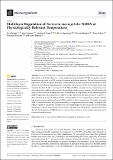Multilayer regulation of Neisseria meningitidis NHBA at physiologically relevant temperatures
Abstract
Neisseria meningitidis colonizes the nasopharynx of humans, and pathogenic strains can disseminate into the bloodstream, causing septicemia and meningitis. NHBA is a surface-exposed lipoprotein expressed by all N. meningitidis strains in different isoforms. Diverse roles have been reported for NHBA in heparin-mediated serum resistance, biofilm formation, and adherence to host tissues. We determined that temperature controls the expression of NHBA in all strains tested, with increased levels at 30–32 °C compared to 37 °C. Higher NHBA expression at lower temperatures was measurable both at mRNA and protein levels, resulting in higher surface exposure. Detailed molecular analysis indicated that multiple molecular mechanisms are responsible for the thermoregulated NHBA expression. The comparison of mRNA steady-state levels and half-lives at 30 °C and 37 °C demonstrated an increased mRNA stability/translatability at lower temperatures. Protein stability was also impacted, resulting in higher NHBA stability at lower temperatures. Ultimately, increased NHBA expression resulted in higher susceptibility to complement-mediated killing. We propose that NHBA regulation in response to temperature downshift might be physiologically relevant during transmission and the initial step(s) of interaction within the host nasopharynx. Together these data describe the importance of NHBA both as a virulence factor and as a vaccine antigen during neisserial colonization and invasion.
Citation
Borghi , S , Antunes , A , Haag , A F , Spinsanti , M , Brignoli , T , Ndoni , E , Scarlato , V & Delany , I 2022 , ' Multilayer regulation of Neisseria meningitidis NHBA at physiologically relevant temperatures ' , Microorganisms , vol. 10 , no. 4 , 834 . https://doi.org/10.3390/microorganisms10040834
Publication
Microorganisms
Status
Peer reviewed
ISSN
2076-2607Type
Journal article
Description
This research was sponsored by GlaxoSmithKline Biologicals SA. A.F.H. was funded by Marie Sklodowska-Curie Intra-European Fellowships (PIEF-GA-2012-328377).Collections
Items in the St Andrews Research Repository are protected by copyright, with all rights reserved, unless otherwise indicated.

